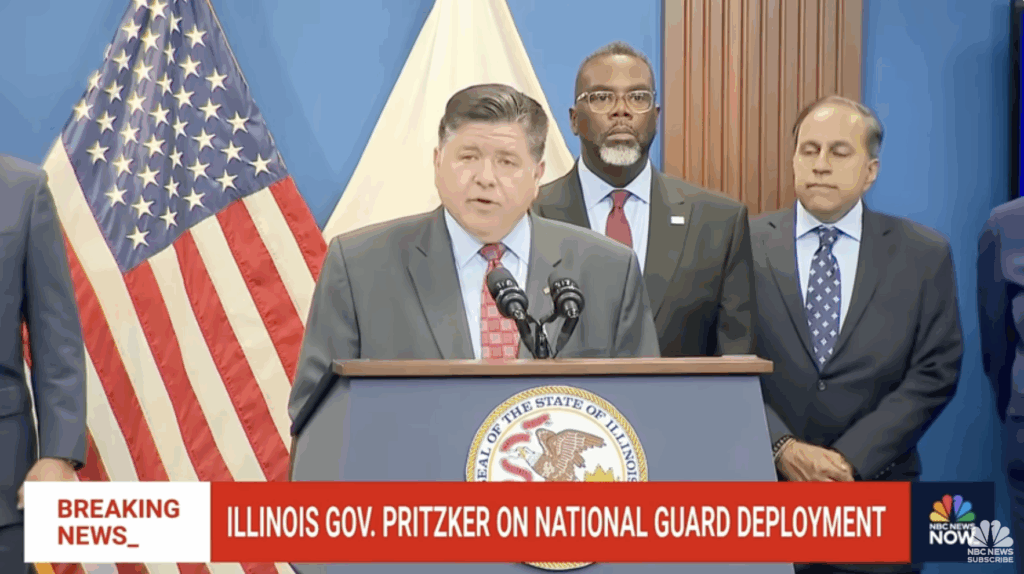Democratic leaders have voiced strong opposition to President Donald Trump's recent decision to deploy National Guard troops to assist Immigration and Customs Enforcement (ICE) agents in enforcing immigration laws. This move has sparked a heated debate over states' rights and federal authority, with some Democrats invoking historical parallels to the Civil War era.
Explainer As A Former DC Cop, The Federal Takeover Was The Right Move
On October 6, 2025, Illinois Governor J.B. Pritzker criticized the deployment, labeling it an "invasion" and urging Texas Governor Greg Abbott to disregard Trump's orders. Pritzker stated, "We must now start calling this what it is: Trump’s Invasion," emphasizing concerns over federal overreach into state matters.
The deployment comes amid rising tensions in cities like Portland and Chicago, where local leaders have expressed frustration with federal law enforcement's actions. In response, Chicago Mayor Brandon Johnson signed an executive order establishing an "ICE Free Zone," which prohibits federal immigration agents from using city property for enforcement activities.
Senators Tammy Duckworth (D-Ill.), Jeff Merkley (D-Ore.), and others issued a joint statement accusing Trump of moving toward "authoritarianism" and infringing on the rights of states. They argued that the president is stretching the limits of his authority by deploying federal troops against the wishes of state governments.
Oregon Governor Tina Kotek echoed these sentiments, asserting that the president's actions represent an abuse of power. "What President Trump is trying to do is a threat to our democracy," Kotek said, emphasizing that governors should control their National Guard troops.
The debate has drawn attention to a historical context, with some commentators noting that Democrats are using rhetoric reminiscent of southern leaders before the Civil War, who argued for states' rights in their opposition to federal authority. Critics argue that this is a contradiction for a party that has historically opposed the Confederacy.
In a statement on social media, former Secretary of State Hillary Clinton also weighed in, asserting that states have the right to resist federal intervention. "If 'states' rights' mean anything, they must include the right to not get invaded by another state in peacetime," Clinton wrote.
The current situation reflects a broader national conversation about immigration enforcement and the balance of power between state and federal governments. In recent years, the Biden administration has taken steps to limit state-level enforcement of immigration laws, arguing that immigration control is a federal responsibility.
In January 2024, the Supreme Court ruled in favor of the Biden administration, allowing federal agents to remove barriers set up by Texas authorities along the border. The court's decision reinforced the notion that immigration enforcement is primarily a federal matter, a point that has been contentious in states like Texas.
As tensions escalate, the implications of this conflict could have lasting effects on the political landscape. The invocation of historical precedents by both sides raises questions about the future of federalism in the United States and the potential for increased polarization.
The ongoing debate highlights a significant divide in American politics, with Democrats emphasizing states' rights in this context while historically advocating for federal intervention in other areas. As the situation develops, it remains to be seen how these dynamics will play out in the coming months.
Why it matters
- Democratic leaders oppose Trump's National Guard deployment, citing concerns over federal overreach and states' rights.
- Illinois Governor Pritzker labels the deployment an 'invasion,' urging resistance from other states.
- The situation reflects a broader national debate on immigration enforcement and federalism, with historical parallels drawn to the Civil War.
What’s next
- Local leaders in Chicago and Portland may implement further measures against federal enforcement actions.
- Democrats plan to rally support for legislation protecting states' rights in immigration enforcement.
- Watch for upcoming statements from other governors regarding their stance on federal troop deployments.
